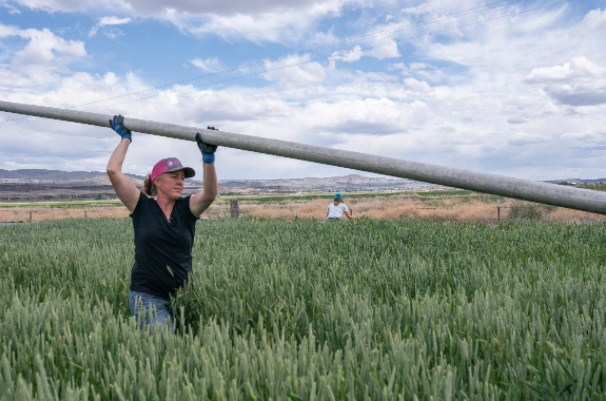May 21, 2025 | 02:29 GMT +7
May 21, 2025 | 02:29 GMT +7
Hotline: 0913.378.918
May 21, 2025 | 02:29 GMT +7
Hotline: 0913.378.918

A farmer moves an irrigation pipe through a field of triticale in California. Photo: AP
The U.S. Department of Agriculture is moving to implement a lending program designed to help farm property heirs resolve ownership and succession issues and hold onto their land.
The department announced Thursday that the Heirs’ Property Relending Program will provide $67 million for loans to resolve property issues that have long kept some producers and landowners from being able to access USDA programs and services. The program’s provisions were included in the 2018 Farm Bill, but it wasn’t implemented during the Trump administration.
The move is a part of the department’s larger push to address long-standing inequities in agriculture, and it helps to fulfill President Joe Biden’s campaign promise of protecting heirs’ property to advance economic equality for farmers of color.
“We can only do things Congress authorizes us to do, and the swiftness through which we implement them can change depending on the administration,” a USDA spokesperson told POLITICO. “The Trump administration probably could have implemented this but didn’t.”
The quick tie to equity: Black farm families in the U.S. have often lost land after handing it down from generation to generation because they do not documentation and access to resources to prove their ownership.
The practice was particularly common during the Reconstruction era, when the lack of access to the legal system resulted in what USDA has previously called “the leading cause of Black involuntary land loss.”
Heirs’ property makes up more than a third of Black-owned land in the South, according to ProPublica. Those landowners “are vulnerable to laws and loopholes that allow speculators and developers to acquire their property.”
The rising frequency and severity of natural disasters also poses a threat to heirs’ farms and other rural property. The Federal Emergency Management Agency more commonly denies disaster aid requests because of title issues in the South in counties that are majority Black, according to a Washington Post analysis.
“While those affected are in all geographic and cultural areas, many Black farmers and other groups who have experienced historic discrimination have inherited heirs’ property,” Agriculture Secretary Tom Vilsack said in a statement. “USDA is committed to revising policies to be more equitable, and examining barriers faced by heirs’ property owners is part of that effort. This helps ensure that we protect the legacy of these family farms for generations to come.”
What’s in the details: The program will provide funding through intermediate lenders for landowners to legally resolve ownership and succession issues.
Heirs can use the loans to resolve title issues by financing the purchase or consolidation of property interests and financing costs associated with succession plans, the USDA said. They cannot use the money for things such as land improvement or development or acquisition or repair of buildings.
Once USDA’s Farm Service Agency selects the recipients, heirs can apply directly through the lenders for loans and assistance.
Lenders with 10 years or more of experience with socially disadvantaged farmers, expertise in similar agricultural and commercial loans or with heirs’ applications already in process, will receive preference, USDA said. If applications exceed the amount of available funds, those received first will be the final evaluation criteria.
(USDA)

(VAN) Attempts to bring down the price of the Japanese staple have had little effect amid a cost-of-living crisis.

(VAN) Fourth most important food crop in peril as Latin America and Caribbean suffer from slow-onset climate disaster.

(VAN) Shifting market dynamics and the noise around new legislation has propelled Trouw Nutrition’s research around early life nutrition in poultry. Today, it continues to be a key area of research.

(VAN) India is concerned about its food security and the livelihoods of its farmers if more US food imports are allowed.

(VAN) FAO's Director-General emphasises the need to work together to transform agrifood systems.

(VAN) Europe is facing its worst outbreak of foot-and-mouth since the start of the century.

(VAN) The central authorities, in early April, released a 10-year plan for rural vitalization.